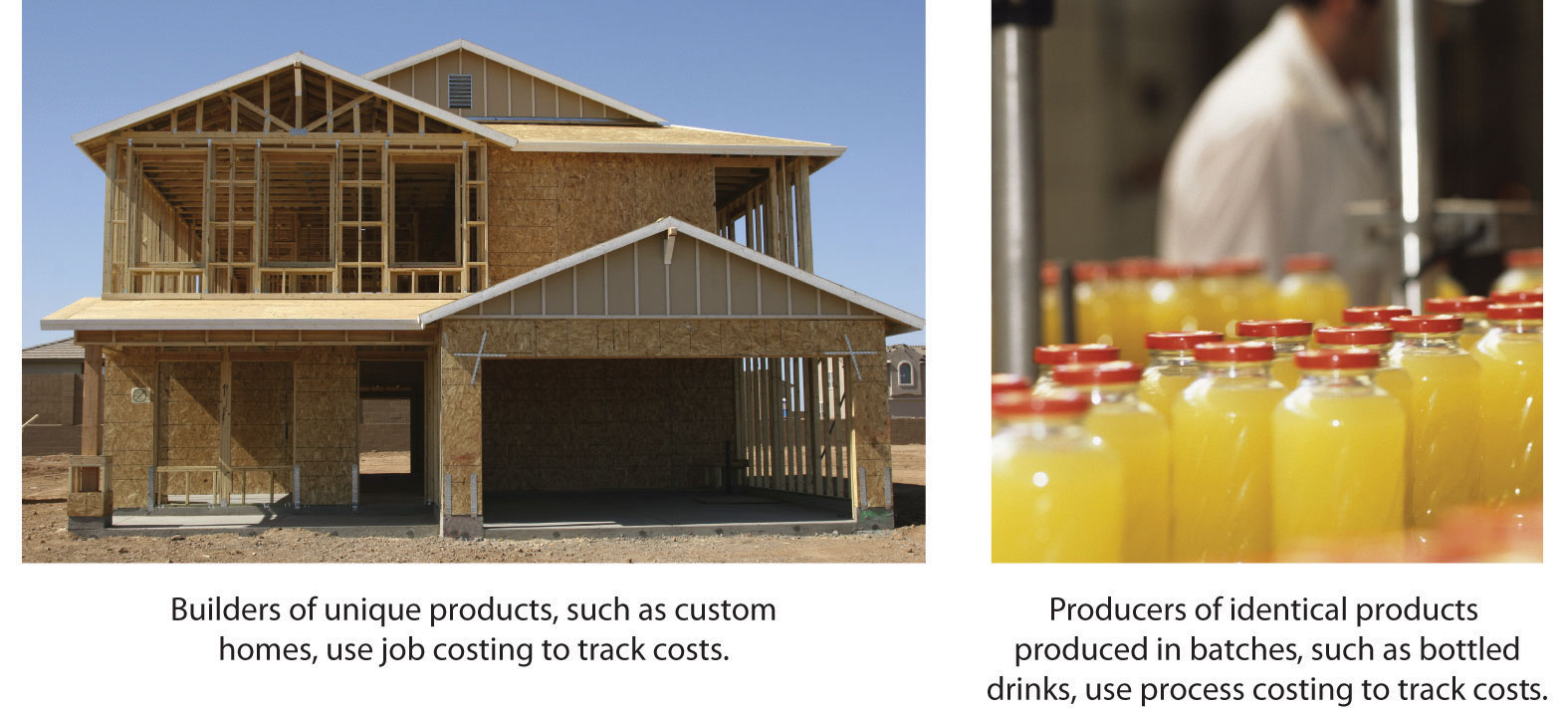This is “Differentiating Job Costing from Process Costing”, section 2.1 from the book Accounting for Managers (v. 1.0). For details on it (including licensing), click here.
For more information on the source of this book, or why it is available for free, please see the project's home page. You can browse or download additional books there. To download a .zip file containing this book to use offline, simply click here.
2.1 Differentiating Job Costing from Process Costing
Learning Objective
- Distinguish between job costing and process costing.
Question: Financial accounting classes cover how merchandising companies, such as Sears and Lowe’s, account for the cost of the goods that they purchase from a supplier and later sell to a customer. These companies simply record the cost of the purchase in an inventory account and account for any returns and allowances, discounts, and shipping costs. Once the merchandise is sold, the related inventory costs are transferred to cost of goods sold. However, manufacturing companies are different. How do manufacturing companies account for inventory at different stages of production?
Answer: Manufacturing companies like Custom Furniture Company, Ford, and IBM don’t have it quite as easy as merchandising companies. They must account for the materials, labor, and other manufacturing costs that go into building the product. The process of accounting for manufacturing costs depends on which costing system a company uses—job costing or process costing.
Job Costing
Question: We define a jobAn activity that results in a unique product, one easily distinguished from other products. as an activity that produces a unique product—one that can be easily distinguished from other products. For example, building a custom home is a job because the home is unique and easy to distinguish from other homes. An accounting firm’s provision of tax services to a client is another example of a job. How does a job costing system help companies that produce unique products or jobs?
Answer: A job costing systemA system that records revenues and costs for each job. records revenues and costs for each job. Because each job at Custom Furniture Company results in a unique product and has different material and labor requirements, the company uses a job costing system.
Tracking revenues and costs for each job is important for several reasons:
- Like Dan at Custom Furniture, managers want to assess the accuracy of cost estimates. This is particularly important when prices are based on estimated costs.
- Managers want to review actual revenues and costs for each job to see if the job is profitable.
- Managers want to compare actual costs with estimated costs throughout a project so they can identify unexpected changes as early in the project as possible. For example, if the cost of mahogany wood increases by 50 percent, Custom Furniture might renegotiate the price of a mahogany table with the customer. If it’s too late to renegotiate the price of a current job, the cost increase could be built into the pricing of future jobs.
Process Costing
Question: Job costing may work for builders of custom furniture and tax professionals, but does job costing make sense for a company that produces soft drinks? Imagine trying to track costs for each can of soda produced. A job costing system would not be appropriate for this type of company. A different costing system, called process costing, would be a better fit. Which types of companies use this type of system?
Answer: Companies that produce identical units of product in batches using a consistent process track costs with a process costing systemA costing system used by companies that produce identical units of product in batches employing a consistent process.. Table 2.1 "Job Costing Versus Process Costing" lists some products and services that require the use of process costing versus job costing, and Figure 2.1 "Examples of Job Costing and Process Costing" shows an example of each. This chapter focuses on job costing. We explore process costing further in Chapter 4 "How Is Process Costing Used to Track Production Costs?".
Table 2.1 Job Costing Versus Process Costing
| Job Costing | Process Costing |
|---|---|
| Custom homes | Oil |
| Custom vans | Chemicals |
| House painting services | Paint |
| Movies | Lumber |
| Airplanes | Milk |
| Bridges | Pencils |
| Legal services | Paper |
Figure 2.1 Examples of Job Costing and Process Costing

© Thinkstock
Key Takeaway
- Job costing systems record revenues and costs for unique products; ones that can be easily distinguished from other products. Process costing systems record revenues and costs for batches of identical units of product. When deciding whether to use a job costing or process costing system, we must understand a company’s products and production processes.
Review Problem 2.1
Identify whether each company listed in the following would use job costing or process costing.
- Coca-Cola Company
- Kelly Moore Paint
- Volkswagen—custom campers
- Universal Studios—movie division
- Chevron Corporation
- Michelin
- Boeing Co.
- Ernst & Young—tax division
Solutions to Review Problem 2.1
- Process costing
- Process costing
- Job costing
- Job costing
- Process costing
- Process costing
- Job costing
- Job costing




